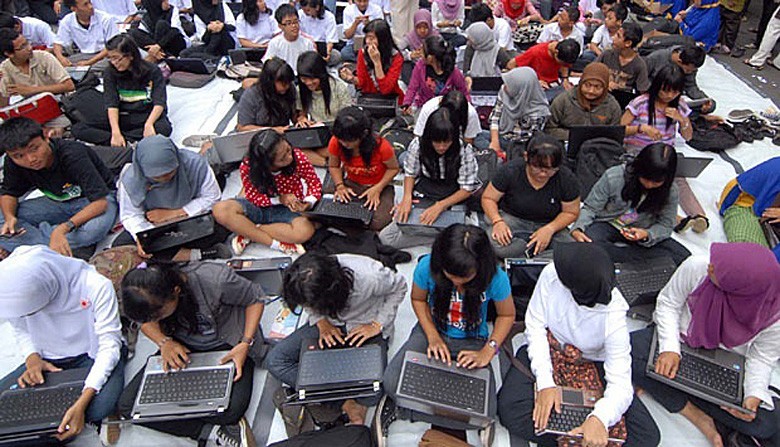Popular Reads
Top Results
Can't find what you're looking for?
View all search resultsPopular Reads
Top Results
Can't find what you're looking for?
View all search resultsChild vloggers prone to abuse
The allure of interacting with millions of others of the same age has drawn children to make their own video blogs (vlogs), through which they can relate their interests and hobbies to strangers.
Change text size
Gift Premium Articles
to Anyone
The allure of interacting with millions of others of the same age has drawn children to make their own video blogs (vlogs), through which they can relate their interests and hobbies to strangers.
Nine-year-old Almeyda Nayara Alzier, for example, had never expected that she would be popularly known as one of Indonesia’s youngest vloggers just a year after she started vlogging.
With only a smartphone and a mobile editing application, she made her first video post about how to make a currently popular toy called “slime.”
After making a few videos about slime, Naya became one of the best-known child vloggers with 139,545 YouTube subscribers.
“Due to her rising popularity, she has been learning gradually to make better videos with some proper editing work,” said Naya’s mother, Imelda Liana Sari. “After watching her doing so, I eventually found vlogging to be a way to boost her creativity and confidence as she has to talk in front of the camera.”
As Naya reaches for internet stardom, the threat of child predators also looms large.
Imelda admitted that she was worried about the Naya’s rising popularity as it had led to some threats. “One day, she called me and asked if it was true that I could not pick her up from school,” Imelda said. “Apparently, there was an unknown man calling her by name and telling her that I had sent him to pick her up.”
Since then, Imelda has been telling Naya to be careful about what she posts on social media by not mentioning her school name or home address.
Moreover, she also prohibits Naya from uploading any real-time posts with the locations tagged.
“Real-time posts might let people know where Naya is currently. So, I don’t agree with that,” said Imelda.
Child expert Seto Mulyadi said that vlogs could be used by child predators to prey on their targets.
To avoid children falling victim because of their vlogging habits, parents and teachers must actively take part in controlling their activities on social media, he said.
They also have to teach their children and students to not share private information, like their school schedules or names, or their addresses, Seto added.
“The lessons [of what to do on social media] cannot be given en masse. It has to be done individually through face-to-face interaction,” he said.
Therefore, it is important for parents to establish the habit of talking with their children, during which they sit side by side at the same eye level without any distraction from gadgets.
“Such conditions will create comfort for children and, thus, they will listen to what their parents say, including information about social media content,” Seto said.
Unlike Naya, 10-year-old twins Jessica Kelzha Latarova and Jasmine Keizha Sharapova had never sat together with their parents to discuss what they should include in their vlogs.
“There are no special notes [from our parents about vlogging],” Jasmine said, adding that their mother even often asked them to feature her in their vlog.
Both Jessica and Jasmine have been vlogging since a year ago, after they watched videos of a young Indonesian vlogger, Olivina Maskan, popularly known as Peachy Liv.
Inspired by her posts, which mostly contain crafting tips and product reviews, the grade 5 twins started to make videos about food, toys or places they found interesting.
“We like to do vlogging because we want to inspire Indonesia’s children to find new and creative activities,” Jessica said, adding that they had the full support of their parents.
Despite a lack of monitoring by their parents, the twins managed to learn by themselves that their posts could make them vulnerable to kidnappers and child predators.
Hence, they decided to not post their daily activities and to not mention their private information, like their address, on their YouTube channel, called Jasmine and Jessica’s Channel.
“We do not want to show our daily activities because of that,” Jasmine said, adding that she and her twin sister also tried to not appear without their headscarves in the videos.










